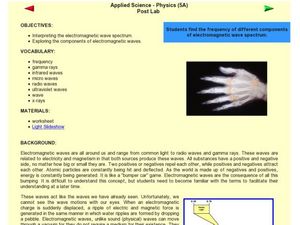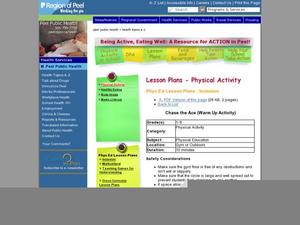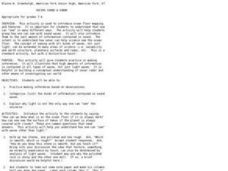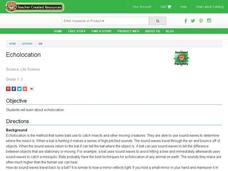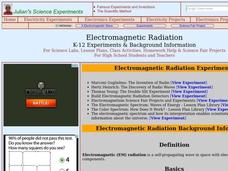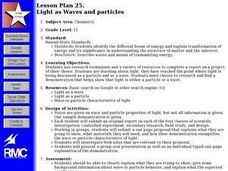Curated OER
Electromagnetic Wave Spectrum
Fifth graders examine electromagnetic wave spectrum. In this science lesson plan, 5th graders discuss the aspects of the electromagnetic wave spectrum and complete a worksheet identifying the parts of the spectrum.
Curated OER
Making Waves with the Electromagnetic Spectrum
Students explore various types of electromagnetic waves, the range of the spectrum, and common sources of electromagnetic waves.
Curated OER
What Wavelength Was That?
A combination of informative text, photos, and graphics comprise this sharp show on electromagnetic radiation. Some slides mention hands-on activities for demonstrating concepts, so if you want to include them you will need to figure out...
Curated OER
Lenses and Mirrors
Students investigate lenses and mirrors showing how they bend and reflect light waves.
Exploratorium
Hot Spot
Not only does a concave mirror focus light waves, it can also concentrate infrared radiation into a hot spot. If you have a small electric heater and such a mirror, demonstrate this for your physical science class.
Exploratorium
A Splash of Color - Is Pure Water Colorless?
What makes the ocean blue but a glass of ocean water nearly colorless? Investigators prepare tubes of water to examine the color of water. Scholars discover the relationship between light absorption, color variations, and water depth as...
Curated OER
Chase the Ace
Chase the Ace is a great warm-up activity for all ages. Just make sure there is plenty of space to run around taking into consideration the number of players and the age of the players. Make the game challenging but not so difficult that...
Curated OER
Fish Tank Optics: Learning How Light Travels
Learners examine light waves and see how they travel. They explain that light moves in waves, which can bounce off of or go through materials. They use a flashlight to shine on a variety of objects.
Curated OER
Making Waves, Making Music, Making Noise
Students construct "talking cans" and instruments to explain how vibration of objects produces various sounds.
Curated OER
The Color Spectrum: How Does it Work?
Create models of the infrared, visible, and ultraviolet portions of the electromagnetic spectrum. Working in small groups, your class can investigate metric conversions calculations. They will find the length of the waves in nanometers,...
Curated OER
Solar Lesson
First graders complete sunlight and solar effects activities to learn about light and its power. In this solar activity instructional activity, 1st graders complete a sunscreen test activity, a light test, a black light test, a cloudy...
Curated OER
Seeing Sound & Sonar
Students make inferences based on different sounds that they hear. In this inferences lesson plan, students will hear sounds of different objects and describe the sounds based on what they hear. They will answer various questions about...
Curated OER
Echolocation
Students explore echolocation. In this bats science lesson, students compare sunlight reflecting off a mirror to sound waves hitting a bat's ears. Students complete a worksheet about bats.
Curated OER
Telecommunication
Each of these slides has notes for a teacher to support the activities that are planned for the students. The slides give details and facts about sound waves. Although this slide show delivers useful information about the sound waves,...
University of Colorado
Designing an Open Spectrograph
Take the class over the rainbow. Pairs or small groups follow directions to create a spectrograph. The pupils measure the angles formed by the different colors of the spectrum along with calculating the lengths formed by the spectrum and...
Science 4 Inquiry
It's Not All Visible
Electromagnetic waves travel though empty space, something no other wave type can accomplish. Young scientists learn more about the entire spectrum of electromagnetic waves. They sort cards and apply their knowledge to create models of...
Curated OER
Using the Spectrophotometer to Analyze a Mixture
General chemistry classes practice spectroscopy. They grasp the relationships between wavelength, absorbance, and solution concentration. Additionally, they gain valuable practice using laboratory equipment such as burets and pipettes....
Curated OER
Applied Science - Technology (5A) Lab
Fifth graders explore electromagnetic waves and light. For this light lesson, 5th graders draw the parts of a wave of the electromagnetic spectrum. They compare a flashlight to a laser to see how the light looks when shined through...
Curated OER
Differential Thermal Calorimetry
Students access prior knowledge of infrared rays, ultraviolet rays, gamma rays, x-rays and cosmic waves. In this electromagnetic waves lesson, students hold a mock trial electromagnetic spectrum. Students present characteristics of the...
Curated OER
Electromagnetic Radiation
Students explore the nature of electromagnetic spectrum through a series of experiments. For this physics lesson, students determine how light behaves under certain circumstances. They explain how humans perceive colors.
Teach Engineering
Electromagnetic Radiation
How can nanoparticles be used in the battle against skin cancer. Class members take on the question as they gather information about electromagnetic radiation, specifically ultraviolet radiation. Pupils learn about the mathematical...
NASA
Tools to Study Tornadoes and Galaxies
Take your class on an intergalactic journey as they explore the galaxy and various meteorological events taking place in our atmosphere each day. Learners investigate electromagnetic waves and the Doppler Effect before gathering radar...
Curated OER
Bronx Cheer Bulb
If you chew or make a "raspberry" while viewing an LED light source, the light will appear to wiggle or flicker. It is not because of the light itself, but because of the vibration of your skull! Have your physics class give this a try...
Curated OER
Light as Waves and Particles
Eleventh graders explore the wave and particle properties of light.


